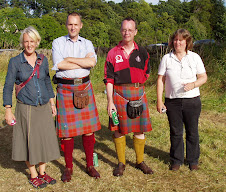Another goodish-day, including a circuit of Drummond Place
Gardens, and some more knitting. The rows are so long now that significant news
is rare.
Non-knit
I meant to add William Trevor to the little list at the end
of yesterday’s post, but his name wouldn’t come to the mental surface despite
strenuous efforts. Mary Lou, thank you, I read that NYT article about writers
making enough to live on, with some interest – but it was about averages, and I
am more interested in the question of whether someone who is writing material
which will live as long as Trollope’s has, can live reasonably well on it
nowadays.
You are right, Shandy, about Trollope’s astonishing energy
and self-discipline. And he hunted until well into middle age – that means,
keeping horses and a groom and getting them and himself to and from the hunt:
that could never have been cheap.
Tamar, I don’t know either of the authors you mention. I’ll
find out.
A new New Yorker came today (August 5 & 12) – much more
interesting than many of late. Beginning with Roz Chast’s suggestions for one’s
morning smoothie.
It was wonderful to find Elizabeth Stout (author) and Olive
Kitteridge (character). The story is a good one, and the news that there is to
be another Olive Kitteridge book, perhaps even better. I pre-ordered it.
I was interested, too, in the review of the book called “The
Mosquito: A Human History of Our Deadliest Predator”. I wish I still had access
to a bookshop (both strength and proximity fail me) so that I could look up the
author’s evidence for the statement that “fifteen centuries before the Scottish
tried to colonize Panama, the Romans tried to colonize them, and were thwarted
by a strain of malaria local to Scotland
which is estimated to have killed half of the 80,000 Roman soldiers sent their way.”
I’ve never seen a mosquito in Scotland (plenty in New
Jersey). But apart from that, the only textual evidence for the Romans in
Scotland is (I think) Tacitus’ biography of his father-in-law, Gnaeus Agricola.
That book is the source of the remark, “They make a solitude and call it peace”.
But I can remember nothing in it about 40,000 deaths by disease.
We “did” that book during my first winter in Glasgow, 1954-5.
I was cold and frightened and culture-shocked. We got to a passage about the
Scottish climate (cold, dark, damp) and the class stamped and whistled. There
were 150 of them, believe it or not. And I sat there and thought, Gosh, these are
the very Scots Tacitus is talking about.



The current New Yorker "Writer's Voice" podcast is Elizabeth Strout reading this good new story. Our local library has Olive Kiitteridge which I've never read and will now seek out. Another treat awaits in the latest New Yorker Fiction podcast, Margaret Atwood reading & commenting on an Alice Munro story.
ReplyDeleteYou've never seen a mosquito in Scotland? Scotland has now shot to the top of my list of places to visit. If there is a single mosquito in Scotland, it will find me. Can you say more about William Trevor? I'm weak on Irish writers, but one of his books came to my attention recently. It sounded promising, but I am unfamiliar with him. I loved the last paragraph in your post. What class was that?
ReplyDeletePeggy, mosquitoes are not a problem in Scotland. What we do have is the Scottish midges Culicoides impunctatus. In certain environments and times of the year they can be a real menace.
DeleteYou can check it out here: https://en.wikipedia.org/wiki/Highland_midge
Once again, Jean, you sent me off to do some research. All I found online about the Romans and their 40,000 loss, was the NYorker article, something in Encyclopedia of Entymology (with no reference!) and an American Journal of Medical Science article which I can't access (any university people here with access through your library?).
ReplyDeleteI was also interested in your comment about solitude and calling it peace. I have heard it quoted as desert most often and also wilderness and even desolation, but this is the the first time I have come across solitutude. It seems to be linked to Byron.
So a bit of a dead end but interesting half hour or so :)